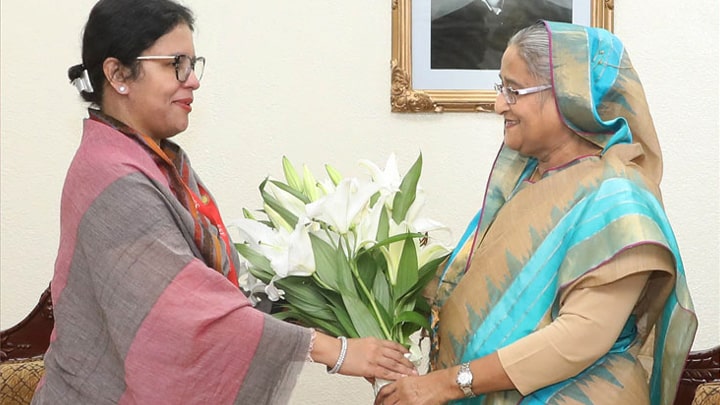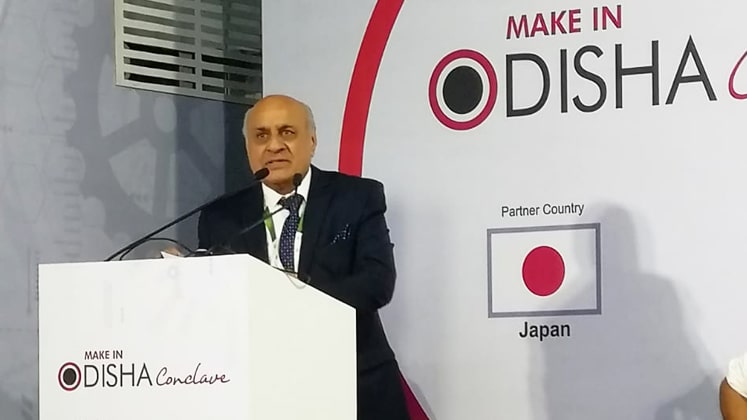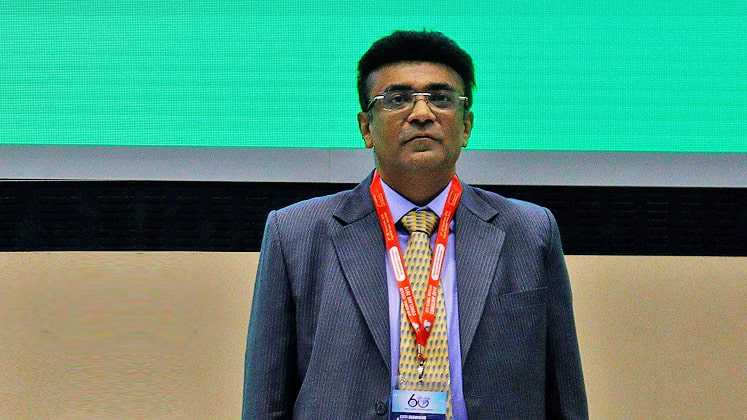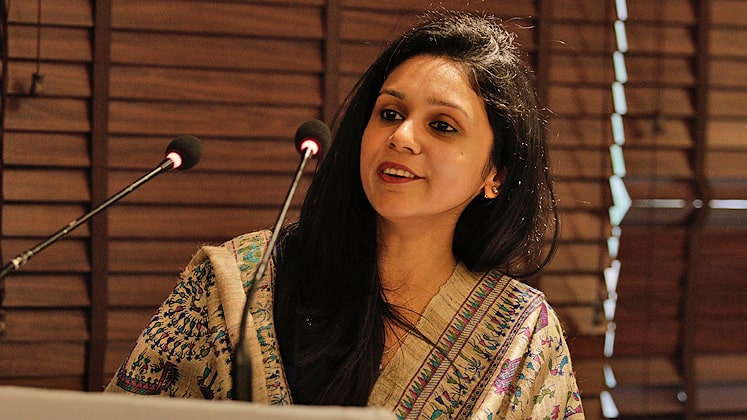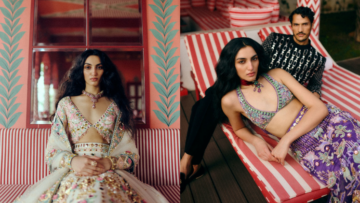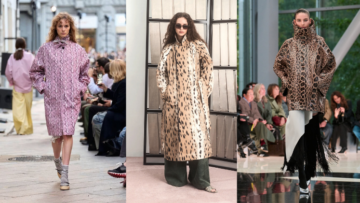Have a closer look at the picture. Bangladesh’s Prime Minister Sheikh Hasina (R) is congratulating Dr. Rubana Huq on winning the Board of Directors of Bangladesh Garment Manufacturers and Exporters Association (BGMEA) elections and becoming the first-ever female president of BGMEA. One thing that is commendable in the shot is that it features two women holding very important positions, in a male dominated society.
With more than 4,300 members, the 36-year-old BGMEA is a national trade organisation of apparel manufacturers in Bangladesh. Rubana Huq represents the Sammilita Forum panel which won all 35 posts for directors in the polls held on 6 April. She is also the MD of Mohammadi Group and her husband late Annisul Huq was also a former BGMEA President. Mohammadi Group diversified into various business segments and works with top global brands like H&M, Walmart, Target, COS, Sears, Springfield, El Corte Ingles and many more.
Besides, Rubana has featured in BBC 100 Women in 2013 and 2014 and her list of achievements are diversified, quite long and impressive. Isn’t it therefore high time to have an honest reality-check of the Indian textile, apparel and handicraft industry where not even a single woman across the country is at the helm in any export promotion council, association or trade bodies? (Buying Agents Association, Delhi being the only exception). Leave apart holding a position at the helm, none of the women of the core working committee seem to be really active at the forefront during any major initiative or development of any such organisation… This is despite the fact that the apparel sector is one of the largest woman employers in India and most of the day-to-day management of apparel exporters is being looked after and taken care of by women only.
Apparel Resources identified and approached 12 such large Indian trade bodies which are quite active and aggressive for the development of the industry and few of them shared their views on this issue. They claim that women are there in their organisation at various levels adding that women do need to come forward and work hard to create their space, and for that, they have to have their own strong business which is currently not the case. Many men who are leading several reputed organisations are also strongly of the view that anyone should not be judged on gender basis. If he or she is capable and active, then they will make a difference.
Trade bodies’ official stand
As far as Indian apparel exporters’ official body – Apparel Export Promotion Council (AEPC), Gurugram, is concerned, it has only two women (professionals and not owners) working in its total nine subcommittees.
“Way back in the year 1985 to 1988, we had Sushma Gulati, member of EC, associated with us. Similarly Shashi Nangia, MD, Swati Exim, had been a permanent invitee to EC in the past. The present absence of elected woman EC members is because of woman representatives not coming forward to participate in such election process. However, AEPC has had woman representatives as invitees several times in the past. The earlier Textile Commissioner Kavita Gupta; Sarada Muraleedharan, DG, NIFT and Aditi Das Rout, Trade Advisor, MoT etc., are some of the recent examples of invitee EC representatives.”
India’s biggest and most respected body specially for the manufacturers of the domestic market, CMAI, Mumbai (Clothing Manufacturers Association of India) shares…
“Apart from elected members, we also have co-opted and invitee members. Seema Mehta and Vidhi Dalal are special invitees to our managing committee, and in fact joint chairperson in one of our subcommittees. In the past too, we have had the tradition of having a couple of female members in our managing committee. Also, another woman, Minal Joshi, has been one of the senior-most members of the EC of our Western India Regional Committee and is likely to be the next Chairperson of the region. Of course, the final decision would be taken by way of an election at the end of the current committee’s term.”
CITI (Confederation of Indian Textile Industry), Delhi, that completed 60 years recently and claims to represents the major leading regional and industry associations, informed…
“There is no as such reason, it’s just that our member associations and corporate members have not nominated anyone to our EC Body – we would more than welcome them.”
However, Buying Agents Association is an exception!
“Apart from Christine E. Rai, Chairperson and Anchal Kansal, General Secretary, BAA has two more women leaders. So out of 14 members in its Governing Body, there are a total of four women. One of the key reasons for this is that buying agents industry has a lot of women entrepreneurs. We have always heard that a ‘man’ is the person with the big vision and a ‘women’ is the one who focuses on the ‘little details’. In cases of buying agencies, these ‘little details’ are the key factor to success and coupled with a visionary role that women are increasingly venturing into, the outcome is more leadership roles for women in this industry. And I do think this trend is not only going to continue but exponentially grow in the future.”
Has the process started?
“Recognising the fact that more active participation of women in the governing body of AEPC would help in better understanding of women’s issues and motivate the women entrepreneurship in the industry, AEPC is planning to form a women’s forum for exchange of ideas and discussion on the subject,” said HKL Magu, Chairman, AEPC.
“It’s the need of the hour to bring women into the business as well as trade bodies. They can contribute in a better way. We are in the process of creating ITF Leadership Academy and we formed women entrepreneurs’ team to manage the academy. The idea is to bring women entrepreneurs slowly into the system and we will induct a few of them into ITF board also in the current year. As per our experience, women entrepreneurs can handle the most challenging roles of today’s times – HR and employee-engagement level and special care for workers. ITF Leadership Academy is going to focus on these areas of our member mills and women entrepreneurs as a team will drive the task,” stated Prabhu Dhamodharan, Convenor, Indian Texpreneurs Federation (ITF), Coimbatore.
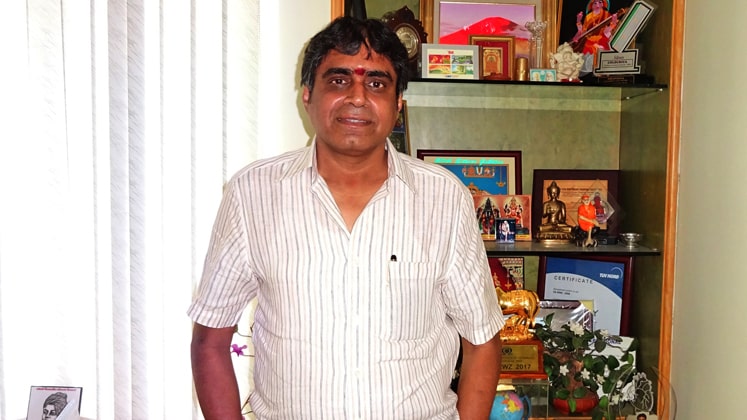
“We have started a women exporter wing of 11 women who are doing good job with regard to knowledge dissemination, zero waste etc. We are encouraging women to come forward and play a more significant role. We do have women forum and women are special invitees in our EC meeting,” asserted Raja M Shanmugham, President, Tirupur Exporters’ Association (TEA), Tirupur.
Q&A
Rahul Mehta, President, CMAI
If women take an active part in trade bodies like yours, will there be any difference in the working as well as in the results of your efforts?
I never look at a person’s performance from a gender perspective. I welcome any industry member, male or female, who is interested in contributing to the industry welfare, to join the association and help it to serve the industry better.
Do you feel that having a woman at the helm of a trade body will in some way improve the condition of women workers in the industry or are men equally sensitive to the issue?
I believe that most men are equally sensitive to issues relating to working conditions for women, special facilities, pay parity, etc. Our industry is one of the few industries which is largely staffed by women and hence the managerial staff has to be conscious of their sensitivities in any case.
Sanjay Jain, Chairman, CITI
Lack of women in the governing body is not the case with any particular trade body, but rather the same for all. What could be the reason for same?
I guess the reason is very few ladies are at the helm of textile businesses – the younger generation is coming, however to reach the EC level, they will take some time. Normally one starts taking interest in associations after the age of 40. My wife Jyoti is the JMD of our company and is in-charge for the branded garment sales. She has been active from the age of 22 years.
We also had a Q&A session with industry insiders on the same. Take a look.
Anchal Kansal, General Secretary, BAA
Overall, lack of women in the governing body is not the case with any particular trade body, but rather the same for all. What could be the reason for the same?
In general, there is a lack of gender parity and gender-balanced appointments in numerous trade bodies. Even larger international organisations such as WTO and UN suffer from poor representation of women. In fact, globally there is just one female parliamentarian against four male counterparts. I believe across the globe, women have rich, yet under-appreciated representation in trade bodies and other governing bodies. There is absolutely no policy framework to tackle this gap and facilitate more women to take up leadership roles.
If women take an active part in trade bodies like yours, will there be any difference in the working as well as in the results of your efforts? I assume it is not about being a man or a woman.
The bottom line is that there should be minimal politics and bias involved so that people with the right experience and competence can come forward. If these attributes take precedence over gender, age or other such biases, it is natural that bodies will work more efficiently and can contribute significantly towards the welfare of their members.
What efforts can be made to increase the women’ role in trade bodies and the industry at large?
The companies should adopt a policy of unbiased hiring. I am never in favour of any quotas but an honest effort to bring in a new perspective will automatically lead to women being involved. There should be policies in place to tackle systematic barriers that stop women from going forward. Talent, experience and expertise should always take precedence over petty politics and nepotism.
Positive Aspects
- Irrespective of all above-mentioned facts and views, the good thing is that when it comes to industry level roles, especially at the SME level and companies doing business worth Rs. 50 crore or Rs. 100 crore or even more, there are hundreds of women who are leading the business as an entrepreneur or are actively involved as co-owners.
- Industry segments like fashion designers, retail specially online have comparatively better women representation as dozens of women have not only initiated their venture, they are continuing these with good growth.
‘I am here to change, not follow… Time has come to run the show professionally…’, Rubana Huq said while speaking to Apparel Online Bangladesh (AOB) exclusively. This sums up her character and vision for the industry! Detailed interview is published in AOB’s May edition.

